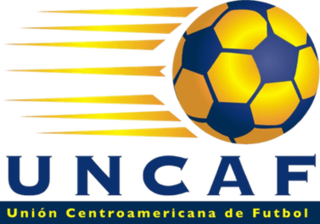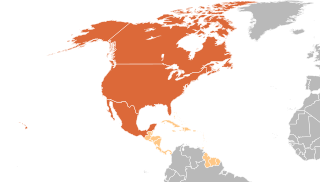
The CONCACAF Gold Cup is the main association football competition of the men's national football teams governed by CONCACAF, determining the continental champion of North America, Central America and the Caribbean. The Gold Cup is held every two years. The tournament succeeded the CONCACAF Championship (1963–1989), with its inaugural edition being held in 1991.

The Confederation of North, Central America and Caribbean Association Football, abbreviated as CONCACAF, is one of FIFA's six continental governing bodies for association football. Its 41 member associations represent countries and territories mainly in North America, including the Caribbean and Central America, and, for geopolitical reasons, three nations from the Guianas subregion of South America—Guyana, Suriname, and French Guiana. The CONCACAF's primary functions are to organize competitions for national teams and clubs, and to conduct the World Cup and Women's World Cup qualifying tournaments.

The Honduras national football team represents Honduras in men's international football. The team is governed by the Federación Nacional Autónoma de Fútbol de Honduras. They are nicknamed Los Catrachos, La Bicolor, or La H.

The El Salvador national football team represents El Salvador in international football, and is governed by the Salvadoran Football Federation (FESFUT).

The Haiti national football team represents Haiti in international football. Haiti is administered by the Fédération Haïtienne de Football (FHF), the governing body for football in Haiti. They have been a member of FIFA since 1934, a member of CONCACAF since 1961 and a member of the Caribbean Football Union (CFU) since 1978. Haiti's home ground is Stade Sylvio Cator in Port-au-Prince and the team's manager is Gabriel Calderón Pellegrino.

The Guatemala national football team represents Guatemala in men's international football and is controlled by the Federación Nacional de Fútbol de Guatemala. Founded in 1919, it has been affiliated to FIFA since 1946, and it is a member of CONCACAF.
The CCCF Championship was an association football (soccer) tournament made for teams in the area of Central America and the Caribbean between the years of 1941 and 1961. It was founded in 1938 and the precursor of the CONCACAF, that was formed when the Confederación Centroamericana y del Caribe de Fútbol (CCCF) merged with the North American Football Confederation (NAFC) in 1961.

The Suriname national football team represents Suriname in international football. The team is controlled by the Surinamese Football Association, which is a member of CONCACAF.

The Unión Centroamericana de Fútbol, more commonly known by the acronym UNCAF, represents the national football teams of Central America: Belize, Costa Rica, El Salvador, Guatemala, Honduras, Nicaragua, and Panama. Its member associations are part of CONCACAF.
The CONCACAF W Championship is an association football competition organized by the Confederation of North, Central American and Caribbean Association Football (CONCACAF) that often serves as the qualifying competition to the Women's World Cup, and recently the Olympics. In years when the tournament has been held outside the World Cup qualifying cycle, non-CONCACAF members have been invited. CONCACAF is the governing body for football for North America, Central America and the Caribbean. The most successful country has been the United States, winning their ninth title in 2022.

The North American Football Confederation (NAFC) was founded in 1946 as the governing body of association football in Northern America, Mexico, and Cuba. The first president of the NAFC was Carlos Alonso who was elected on 19 December 1946 in Havana. In 1961 it merged with the Confederación Centroamericana y del Caribe de Fútbol (CCCF) to form CONCACAF.

The Confederación Centroamericana y del Caribe de Fútbol, also known by its initialism CCCF, was the governing body of association football in Central America and the Caribbean from 1938 to 1961.
The Panamerican Championship was an international football tournament held by the Panamerican Football Confederation every four years with three editions held from 1952 through 1960.

The North American Football Union is a regional grouping under CONCACAF of national football organizations in the North American Zone. The NAFU has no organizational structure. The statutes say "CONCACAF shall recognize ... The North American Football Union (NAFU)". The NAFU provide one of CONCACAF's representatives to the FIFA Executive Committee.

The Curaçao national football team represents Curaçao in international football, and is controlled by the Curaçao Football Federation.
The 2012–13 CONCACAF Champions League was the 5th edition of the CONCACAF Champions League under its current name, and overall the 48th edition of the premier football club competition organized by CONCACAF, the regional governing body of North America, Central America and the Caribbean. It remained a 24-team tournament, but the format changed for this edition. CCL play began on July 31, 2012 and finished on May 1, 2013. The winner qualified as the CONCACAF representative for the 2013 FIFA Club World Cup.
The 2013–14 CONCACAF Champions League was the 6th edition of the CONCACAF Champions League under its current name, and overall the 49th edition of the premier football club competition organized by CONCACAF, the regional governing body of North America, Central America and the Caribbean. Monterrey were the three-time defending champions, but were unable to defend their title as they failed to qualify for the tournament.
This is a list of records and statistics of the CONCACAF Gold Cup. The Gold Cup replaced the CONCACAF Championship, which was held ten times from 1963 to 1989. Before the merger and foundation of CONCACAF, the confederation was split into two entities with their own international tournament, NAFU's North American Nations Cup and the CCCF Championship.
The North, Central American and Caribbean section of the 1962 FIFA World Cup qualification acted as qualifiers for the 1962 FIFA World Cup in Chile, for national teams which are members of the CCCF and NAFC. Seven teams participated in the tournament to compete for one place in the inter-confederation play-offs against a CONMEBOL team.












